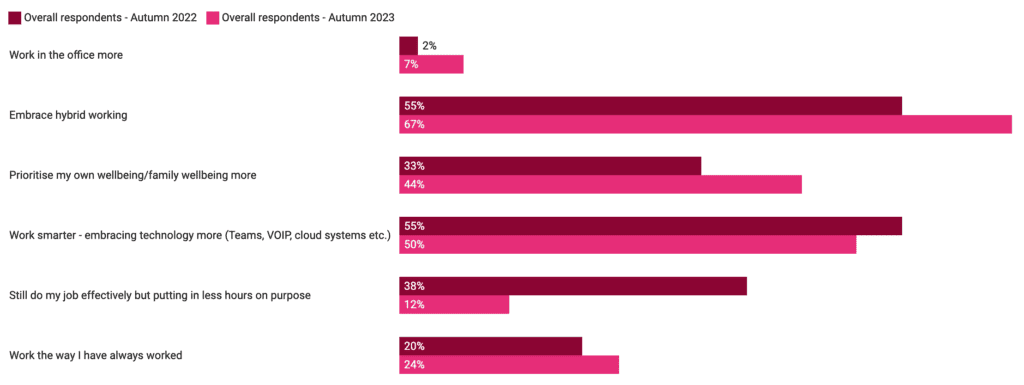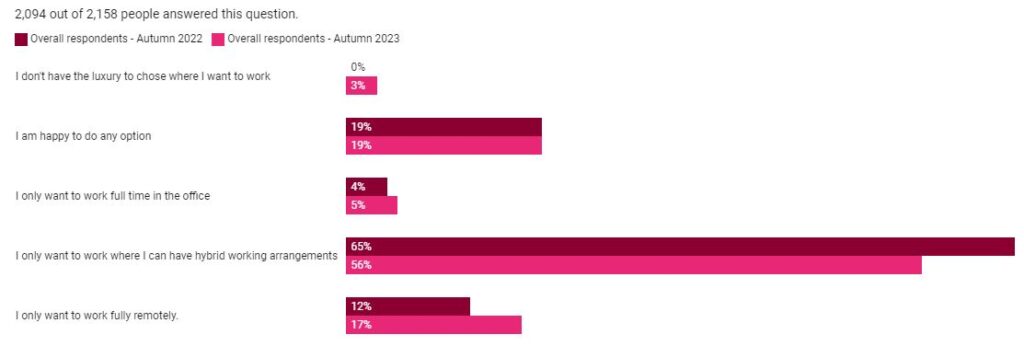Winter Candidate Sentiment Survey – Part 1: Working from home, flexible jobs and the future of the office

Part 1 of our Winter Candidate sentiment survey, as first published on The Currency.
Twice a year we run a Candidate Sentiment Survey to assess candidates’ attitudes to certain topics. This is part 1 of our Winter Candidate sentiment survey, as first published on The Currency.
- 2,158 candidates completed the survey.
- The candidates surveyed were from junior management to “C” suite level across the IT, finance, accounting, legal, HR, and ESG professions.
- The candidates were presented with a multiple-choice answer for every question, bar the first question, where they chose every answer applicable to them.
- Where the same question was asked in our Autumn 2022 survey, we provide a comparison to Autumn 2023.
- The survey had a “free text” box at the end, and over 10 percent of the candidates chose to give us their observations on certain topics.
- Their observations are under the relevant questions in italics, and we have purposely given them a voice; this is their survey.
Please hover over the graphic to magnify it.
*****
Post-pandemic, now that things are settling back to normal, I…
Comparing the responses to the same questions from Autumn 2022, more people are working the way they always worked and are back doing more hours.
As the hybrid market is maturing, we see a 20 per cent jump in those embracing hybrid working (67 per cent from 55 per cent). In tandem, over three times as many people are working in the office (seven per cent from two per cent), albeit coming from a low base. Many respondents who do hybrid work seem to be spending more time in the office than before while still working from home.
Interestingly, a third more (44 per cent from 33 per cent) are prioritising their family and wellbeing; respondents seem to be more aware of wellbeing, a legacy of Covid-19 living it seems.
What the respondents said:
“In HR, you deal with people, and if they have to come in to work, so do you most of the time.”
“I think people like me who did the rat race for 20 years prior to COVID-19 will not return to five working days in the office.”
“Currently, there is a push to do more days on-site. If this continues, it will be the defining reason for me moving. I also feel these decisions are being made primarily by men who have ‘always done it that way’. But society has seen a better way; why would we want to go back?”
Which of these statements best reflects your thoughts on where you want to physically work TODAY?
This question concentrates on where the respondents themselves want to work if it was their choice. Many of the answers to these questions remained consistent from the previous year (the last question was not asked in 2022). There is a significant upsurge of 40 per cent (17 per cent from 12 per cent) who only want to work fully remotely.
Conversely, the number of people who would elect to work in a hybrid fashion has fallen from 65 per cent to 56 per cent, while working full-time in the office saw a 25 per cent jump, albeit again from a low base, four per cent to five per cent. This suggests that the desire of respondents to move from hybrid to remote is something we need to keep an eye on.
What the respondents said:
“Businesses must give the option to full remote work from ANYWHERE not just the country they mainly reside. The mentality must change.”
“I live 80km from my office, so I travel once a week as opposed to the two days per week requirement. If I were forced to travel any more than that, I would simply leave. Not worth it.”
“We have lost people and prospects by having a rigid set of days.”
“My thoughts on WFH are that it should be driven by the function that is performing the work; some functions lend themselves more easily to a hybrid balance than others. It is also very important for junior talent to feel the culture/environment of a company, as this is not something that can be experienced online over a sustained period. If companies are looking for tenure from their employees, then this is something that comes with time and relationships with their team and the management of an organisation.”
“I used to travel 2.5 hours each way for many years. I was always tired and had no time for myself or my family. Well before Covid-19, I had an arrangement to work from home some days. Then after the beast from the east, I worked from home all the time and only went to the office maybe once a month… my management at the time was so happy with this as my work was done as well as before, and I am also able to help others out when they need me.”
“Sharing of experience and ideas requires a team to be in the same room if it is to happen effectively. That said, one or two days of WFH will not harm this and has a positive impact on an employee’s well-being and family life.”
“Depending on the length of service and experience with the team, it would be difficult to work from home if I did not know the team for a long time.”
“I’ve been working at home since 2009. I like the flexibility & balance of WFH, visiting customers, attending expos, exhibitions and going to the office when necessary.”
“WFH works on an individual basis. Some people can work more efficiently and conveniently, whereas others (like me) prefer the motivation of being in an office environment as I feel I procrastinate whilst at home.”
“There is a lot of promotion to return to the office that centres around the benefits of in-person communication and the negatives of remote working but no focus on the negatives of in-office days or the benefits of remote working. The conversation on returning to the office is never a balanced discussion.”
My employer…
Over half the respondents are allowed to choose when they can work in the office, with a third of employers mandating set days to be in the office. Less than 10 per cent of employers insist that people return to the office full-time; anecdotally, we hear this trend is rising. Other businesses operate fully remotely, albeit at a low figure of three per cent.
What the respondents said:
“I believe a lot of people’s preferences with regard to working from home, hybrid, FT office, etc., depend a lot on their personal circumstances. An employee starting out in their career probably feels the need to engage more face-to-face in an office environment, whereas a working parent finds the challenges of a commute more stressful. Balance is key, and finding the balance that works for you is important. Employers should embrace people who are different with varying demands on their time.”
“Personally, it’s about flexible hours in the office instead of home/office hours. My view.”
“Employers trying to increase engagement and presenteeism feel like a desperate ploy to tie employees to the work and save the value of their buildings.”
“The balance between WFH and office needs to revert to pre-Covid-19 time for the majority of roles – career development and progress will be impacted.”
“I am 50. Mostly remote work for me, but I think it must be very difficult for younger employees starting out. So much is learned in an office environment by osmosis! Older workers need to remember that they were mentored and helped, and they need to do the same for this generation of young workers.”
“Most firms want to get the balance right between home and office. But haven’t yet achieved it! This requires a lot of management effort to define and enforce ways of working. Pointless to come into the office if you only spend time on Teams talking to people at home! – and time at home needs boundaries for concentration and delivery. A lot of office life has become more dysfunctional since Covid-19 – more meetings, not less, the same priority of urgent over important – this requires effort by management to solve!”
“In the last four years, I have worked nearly exclusively at home, in an organisation with nearly 6,000 employees.”
“Despite efforts to the contrary, I think working from home, either exclusively or through hybrid working arrangements, is here to stay.”
“Working from home must be measured. Young employees may have difficulty putting in eight hours working at home. Employers must be responsible.”
“Employers need to be more flexible with hybrid working to attract and retain talent. Also, salaries need to be reviewed with rising costs.”
“I generally work with and manage what would be considered a ‘”‘younger generation’ of employees. I feel there would be a broader divide between my opinions on the questions in this survey (I’m in my mid-50s now) to, say, the 25-35 age bracket of office-based professionals.”
“I think there is a strong generational/age aspect to the want to be in the office or not, but it may end up being a different career trajectory for them; only time will tell.”
How many days does your employer require you to come into the office?
There are no real surprises here; most of our clients offering hybrid work options have their teams in two or three days in the office. That over one in 10 employers are looking at four days on-site is a trend to keep an eye on, especially when you add it to the eight per cent in the office full-time, so one in five employees are back working in the office a minimum of four days a week.
What the respondents said:
“Personally, I like going into the office a few days a week (I love the flexibility of one to two days WFH), but I think a lot of companies are slowly shifting away from hybrid models.”
“I work in the office four days; we are required to do three, but with people choosing their WFH days, it’s hard to get people together for meetings, and even if in the office, it’s still Zoom meetings. I would prefer in-person meetings as they are more productive. On Zoom, people are distracted and are doing other things.”
“Of the three days we’ve been asked to return to the office, two are fixed with one flexible day. They are making some accommodation for key talent who may have moved during Covid-19 and they don’t want to lose them.”
“I try to focus more on the outcome/productivity of my team and not focus on the where so much.”
“Mandatory three days in office with one anchor day but I pick and choose the two days to juggle family commitments. I have a short commute in Limerick with plenty of parking so the RTO not really impacting me.”
“My sense is the balance shall revert to employers in the next six months. This may result in more employers requesting employees to be on site full-time. Employers may be underestimating how this might impact their ability to retain and hire.”
“Case Law will dictate working from home in the future – just awaiting a WRC case outcome to set the tone.”
At the moment my physical working arrangements are…
That one in every six respondents is looking at their physical workspace as a reason to go on the jobs market is something employers need to be cognisant of. This is particularly relevant if employers are mandating a return to the office.
What the respondents said:
“Managers do not have the skillsets to run remote teams efficiently. There is a need to skill up managers on communicating with remote workers.”
“Leadership should led by the example. Alternative work hubs for collaboration could be an option.”
“My preference for WFH is driven by being able to afford to buy what I want in Dublin, so I will be moving to Wicklow/Wexford. I will still go to the office as needed.”
“Employees will leave companies who enforce a full return to the office.”
“I believe that work-life balance is crucial for organisations success, however, somehow, most older managers don’t want to accept it.
“Employees want to work in a meaningful manner. To get the best out of them they need to be treated like adults. Autonomy, responsibility, and trust are key. If I don’t get those I move on.”
“Always be open to hearing feedback from your employees, and if mandating people back to the office for collaboration, ensure senior management applies to that also. I was remotely managed and had to bring all my teams back, and not once physically met my own direct management team.”
“In my view, the option to WFH is essential and would be one of the top three considerations if I was changing employment. Currently, my employer allows two days per week, but I would prefer three.”
“Employees are often not told the value of physically working together – this needs to be promoted.”
“I believe working full time remotely leads to a cultural and relationship disconnect in my experience. Attending the office weekly or at least a few days a month should be a minimum to maintain productive engagement and relationships, etc.”
“Likely that many firms will continue to ask employees to go back to the office, not just for culture but also so that grads can learn from experienced employees.”
We would like to thank all the respondents for filling out the survey. Special thanks to those who chose to add comments; these were particularly illuminating.
This article was initially published on The Currency website.




